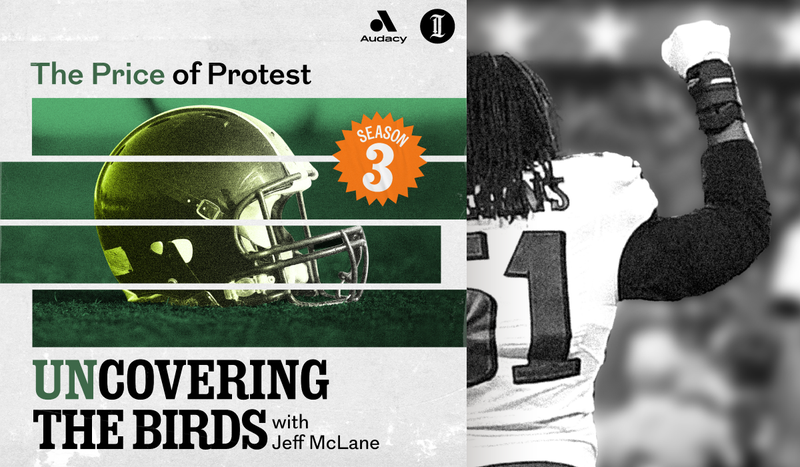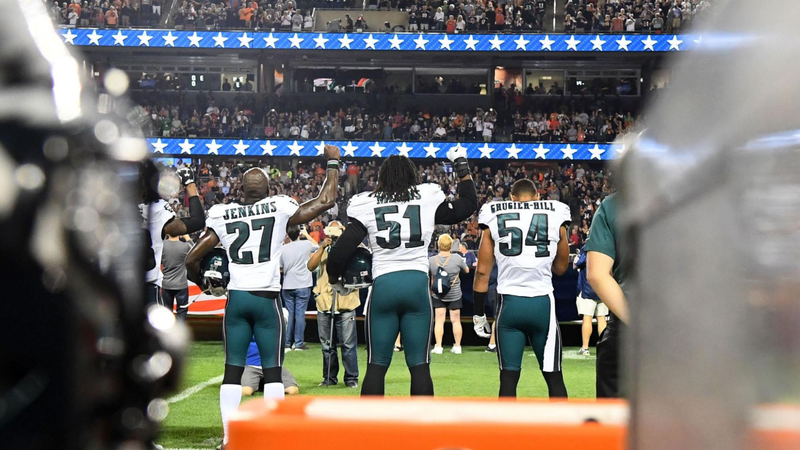
PHILADELPHIA (KYW Newsradio) — Steven Means may not have always been able to see it around him in the East Side Buffalo community where he grew up.
Even as more and more Black men were being shot by police, he wasn’t fully versed in the concept.
When George Floyd was murdered, Means was fed up. Enough was enough.
He had to share his experiences with institutional racism.
“I just let my truth fly,” Means said.
Means, who played defensive end in the NFL for parts of eight seasons, was with the Atlanta Falcons when Floyd was killed by Minneapolis police on May 25, 2020.
Just two weeks after Floyd’s death, Means published a personal, raw article for the Falcons’ website.
He wrote about the normalization of police brutality in his neighborhood.
He revealed he had long felt that, as a Black man, his voice was neither heard nor acknowledged.
He expressed hope that he and like-minded NFL players could use their platforms as professional athletes to heighten awareness for racial justice.
Four years later, has there been progress?
“I still feel the same,” Means told The Philadelphia Inquirer’s Jeff McLane on the “unCovering the Birds” podcast.
Between the 2022 racist mass shooting at an inner-city Buffalo supermarket blocks from his childhood doorstep and the killings of Black friends by law enforcement that he alleges were questionable, Means has had to bear heavy racial trauma.
His first public foray into activism came when, as a member of the Philadelphia Eagles, he raised his right fist during the national anthem alongside teammate Malcolm Jenkins before a Monday night game in Chicago.
“I remember feeling [Jenkins’] arm go up, that's when I put up mine,” said Means, recalling the Sept. 19, 2016 protest at Soldier Field. “I remember the whole atmosphere changed. Everything was different from that moment.”
Like Jenkins, Means was angry that two Black men, Alton Sterling and Philando Castile, were shot and killed by police earlier that year.
San Francisco 49ers quarterback Colin Kaepernick set off a firestorm in the 2016 preseason by sitting and kneeling during the national anthem.
In a players-only meeting heading into the regular season, Jenkins informed teammates he planned to take a stand, too.
“You could feel the angst in the room,” Means said.
Not everyone was on board.
Some players, including Black ones, walked out.
Not Means.
He told Jenkins the veteran safety had his support.
“Just let me know what we’re gonna do,” Means remembers saying.
The Eagles’ first game of the 2016 season fell on Sept.11, so Jenkins delayed his protest out of respect to the anniversary of the 2001 terror attack.
The next week, the Eagles faced the Bears at Soldier Field.
When the anthem began, Jenkins, Means, Ron Brooks, and Marcus Smith stood together on the Eagles’ sideline, fists in the air.

“I'm not thinking this is about to be crazy, this is about to be bad, or it’s going to be heightened because we're the primetime game. I didn't take any of that into consideration,” said Means. “I just was like, ‘This is the right thing to do.’ That's the only thing that went through my mind.”
Then, the boos started.
There was also dissent on the Eagles’ sideline.
According to Means, at least one member of the organization was so upset someone had to physically calm him down.
The rest of the night, Means was playing games in his head as much as he was playing a game on the field.
“That whole game, I was thinking, ‘Okay, I'm getting cut tomorrow.’”
Means and Jenkins were aligned in their beliefs and actions, but when it came to football values, their pedigrees were totally different.
Means had bounced around multiple teams and practice squads after getting drafted by the Tampa Bay Buccaneers in the fifth round in 2013. Jenkins, on the other hand, was a perennial Pro Bowler who the Eagles had just signed to the biggest contract of his life in the 2016 offseason.
Means was dispensable. Jenkins had stability, clout, and financial security.
“I started thinking, ‘Oh no. Do [I] have enough money in [my] account to, like, make it through? because after this game, [I’m] done with the Eagles and probably won’t play again,’” Means said.
“That was just what was in my head that whole game.”
Means didn’t get cut. In fact, the Eagles re-signed him to a one-year contract in 2017, and he was part of that year’s Super Bowl run.
Means might have ultimately gotten a ring, but the backlash he withstood in the aftermath of participating in the anthem protest was fierce.
Despite threats to both his life and job, Means still feels it was worth it.
“The reason why you do a protest is to raise awareness,” he said. “We had done that. You could feel the weight of the world in that moment that we had done that.”
Find out how Means reconciled criticism and judgment both from outside the Eagles’ organization and within it on the latest “unCovering the Birds” episode: “The price of protest.”
